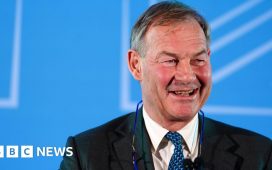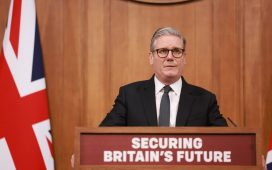BRITAIN’S Armed Forces have been put on standby for a “dangerous” year ahead amid growing fears of spiralling conflict in the Middle East.
Defence Secretary Grant Shapps issued the stark warning last night as he thanked military personnel involved in the recent attacks on Yemen’s Houthi bases.
It came as 200,000 pro-Palestine demonstrators marched through London yesterday.
Some were chanting for the destruction of Israel and hailing the Houthi’s recent attacks on Western ships.
More than 1,700 police officers patrolled the march, which went through central London to Westminster and there were several arrests.
In the US, Lt General Douglas Sims slapped down revenge threats from Houthi warlords declaring: “We simply are not going to be messed with here.”
Read More on the Middle East
Four RAF Typhoons, 12 US F-35 Lightning stealth fighters, several US warships and submarines hit 60 targets with over 100 precision-guided munitions on Thursday night.
Pictures released yesterday showed a radar site near Yemen’s Sanaa International Airport, before and after the attacks.
The strikes were followed up by another Tomahawk cruise missile barrage from the destroyer USS Carney early yesterday.
Mr Shapps sent a message to Lt Gen Charles Stickland, Britain’s chief of joint operations, hailing those involved.
The message — seen by The Sun on Sunday — states: “Your professionalism is noted by the whole nation with pride.
“The past days have showcased the sense of purpose, strength and expertise across Defence.
“As we start 2024 in a more challenging and dangerous world, we will need to draw on this even more. I have total trust that Defence will rise to the task.”
He said Houthis had launched “illegal, dangerous and destabilising” attacks “risking lives at sea and threatening freedom of navigation and flow of trade”.
Backed by Iran, the Houthis are waging war on Western ships in the Red Sea “in sympathy” with Hamas in Gaza.
Their attacks threaten to send global prices rocketing again and could even plunge Britain into recession due to the devastating impact they have on trade.
On January 9, British warship HMS Diamond shot down seven drones launched by Houthi fighters in the Red Sea.
It was the first time in 32 years a Royal Navy ship has shot at a target in the sky in anger.
Former Defence Secretary Ben Wallace said the crisis shows the need for Britain to increase military spending.
He told The Sun on Sunday: “Sadly, the world is getting more unstable and insecure.
“We need to invest now to be ready for what may come in the next few years. Our defence needs between 2.5 to 3 per cent of GDP to be match fit.”
Houthi military spokesman Yahya Saree vowed the US and British airstrikes would “not go unanswered and unpunished” after at least five of his comrades died.
Another leader of the Iran-backed rebel group pledged revenge “beyond the imagination”.
But straight-talking Lt Gen Douglas Sims, director of the US military’s Joint Staff, said a strike force of warships and aircraft was ready for any retaliation.
He went on to say such a move would be “a mistake”.
US President Joe Biden declared he was “confident we’re well prepared” for anything the rebel force was plotting and said he had sent a private warning message to Iran.
The rebels have vowed to continue targeting vessels passing their territory in eastern Yemen until Israel halts its war in Gaza — launched to avenge the Hamas October 7 massacres.
There were reports of “suspicious” small boats approaching merchant ships in the region, but only one rocket has been launched by Houthis since Thursday.
Analysts fear attacks by Western forces on sites in Yemen could bring a wider regional conflict, sucking in Israel’s enemies Iran, Syria and Hezbollah in Lebanon.
The US and UK had issued repeated warnings to the Houthis, which were ignored for weeks.
They had no option but to attack when the group launched their biggest drone and missile blitz at a Royal Navy destroyer and other US war ships on Tuesday.
White House spokesman John Kirby said yesterday: “We’re not interested in a war with Yemen.
“In fact, everything the President has been doing has been trying to prevent any escalation of conflict, including the strikes last night.”
Fears of this escalation rose as Western sources revealed Iran has been providing not only weapons but also intelligence to Houthis.
The UK was not involved in yesterday’s more limited attacks, but Foreign Secretary Lord David Cameron has refused to rule out further action.
Three of those arrested at yesterday’s London march were handing out flyers backing Hamas’ massacre of Jews.
Two others were held for carrying offensive placards and another for possessing stickers to create criminal damage.
Speakers at Trafalgar Square included Sinn Finn president Mary Lou McDonald, Palestinian UK ambassador Husam Zomlot and ex-Labour leader Jeremy Corbyn.
Israel says it killed three armed Palestinians teenagers who were trying to break into a settlement in the occupied West Bank overnight on Friday.
Threats to trade and fuel prices
HOUTHI rebel attacks are a major blow to world trade — and threaten UK petrol prices.
Warlords with drones from Iran are terrorising vessels sailing to the crucial Suez Canal through a Red Sea straight.
About 12 per cent of global commercial shipping uses the route — and so far more than 2,000 vessels have been forced to divert thousands of miles.
Supertankers carrying fuel to Europe are steering clear of the area in a move that could see us paying more for petrol.
Brent Crude oil cost jumped four per cent after the US and UK retaliation strikes in Yemen.
It hit $80 (£62.83) per barrel for the first time this year.
Car giants Tesla and Volvo have been forced to suspend some production in Europe as they wait for delayed parts.
















